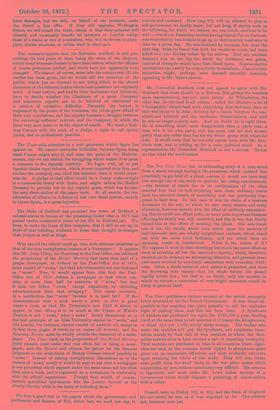Why should the official mind go into such abstruse questions
as that of the true metaphysical essence of a Newspaper? It appears that Mr. John Tilley, the Secretary to the Post Office, has informed the proprietors of the Bristol Mercury that more than half of a proper newspaper, as defined by the Post-Office Act of 1870, must consist of "news," and that advertisements are not reckoned as "news." Now, it would appear from this that the Post- Office Act of 1870 defines a newspaper as that which con- sists, in more than half its contents, of "news," but that it does not define "news," except negatively, by excluding advertisements from that category ? This seems eccentric. Is a notification lees " news " because it is paid for? If the announcement that a cook wants a place or that a place wants a cook, or that Mr. Tennyson's new Idyll is about to appear, or that Money is to be acted at the Prince of Wales's Theatre is not news," what is news? Surely discussions as to the best principle of an Irish University cannot be "news," and this journal, for instance, cannot consist of news at all, except in its first three pages, of which by no means all is news ; and the Saturday Review must be wholly outside the character of a news- paper. The Times itself, as the proprietors of the Bristol Mercury justly remark, must under this rule often fail of being a news- paper; and the Record still oftener, for !Were on the Bennett judgment or the wickedness of Bishop Odense cannot possibly be news." Instead of raising metaphysical discussions as to the essence of 'news,' surely it would be easy to say that a newspaper is any periodical which appears under the same name not less often than once a week, and is registered as a newspaper in conformity with the official regulations. Though that would, of coarse, include periodical tale-bearers like the London Journal or the Family Herald, what is the harm of including them ?


































 Previous page
Previous page